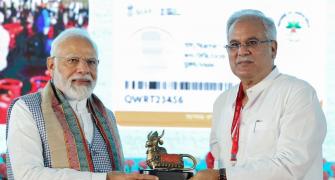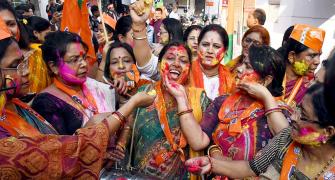Factors such as anti-incumbency, voter fatigue, and dissatisfaction among the youth contributed mainly to the poor showing of Bharat Rashtra Samithi in the Telangana legislative assembly election on Sunday.

Despite the towering image of BRS supremo and Chief Minister K Chandrasekhar Rao, along with the party's extensive grassroots network and welfare programmes, the perceived inaccessibility of its leaders contributed to the growing anti-incumbency sentiments.
Additionally, the opposition projection of what they called the BRS family rule in the state further exacerbated this sentiment.
The party's decision to renominate most of the 119 MLAs did not yield the desired results either.
The BRS has dominated Telangana politics since the state's formation in 2014 and had a significant presence even in undivided Andhra Pradesh since 2001.
While the BRS government introduced various welfare schemes, its alleged failure to fulfill key election promises, including providing housing for the poor, ensuring significant job creation, doling out unemployment relief, as well as the delayed implementation of farmers' loan waivers and the leak of recruitment test question papers worked against them.
The Bharatiya Janata Party was initially considered the main opposition to BRS, but the scenario changed after the Congress gained momentum following the Karnataka elections in May.
Allegations of an implicit understanding between BRS and BJP, particularly regarding the Delhi excise policy case involving Chief Minister K Chandrasekhar Rao's daughter Kavitha, weakened the BJP, leading anti-establishment votes to consolidate in favour of the Congress.
Unlike previous elections where sentiments for separate statehood played a crucial role, emotional issues did not significantly sway this election.
In 2018, the Congress and Telugu DesamParty formed an alliance, with BRS accusing TDP Chief N Chandrababu Naidu of being anti-Telangana. However, TDP chose not to contest the recent Telangana assembly election due to ongoing legal issues and Naidu's imprisonment in Andhra Pradesh.
Similarly, YSR Telangana Party (YSRTP) led by Y S Sharmila, daughter of former undivided Andhra Pradesh Chief Minister Y S Rajasekhara Reddy, withdrew from the contest, declaring support for the Congress.
The Congress ran an assertive campaign centered on the theme of change, encapsulated in the slogan 'marpu kavali - Congress ravali' (there should be change - Congress should come), which effectively resonated with the electorate.










